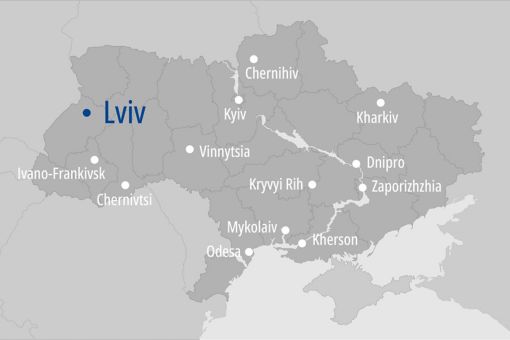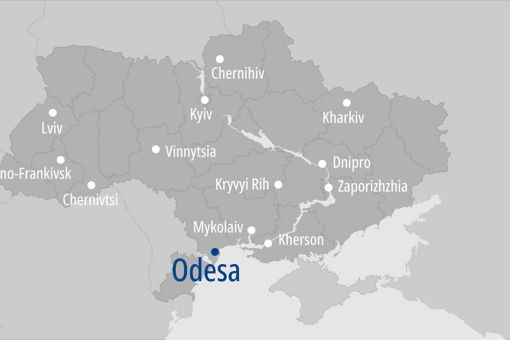The largest business locations in Ukraine
Well-trained skilled labour, a strong industrial base and a growing IT sector make Ukraine an attractive market. Reconstruction can modernise numerous sectors and open up new business opportunities.
Particularly in the country's largest economic centres - including Kyiv, Lviv, Odesa, Kharkiv and Dnipro - investment opportunities are emerging in industry, technology, construction, renewable energies and many other areas. International companies that enter this market at an early stage can benefit from the economic recovery and growth in the long term.
As a global organisation with over 145 member firms worldwide, KPMG works closely with national firms and local experts on the ground. This integrated network provides in-depth local knowledge and comprehensive regional expertise, enabling investors to make informed decisions based on a holistic understanding of the market and its dynamics.
Lviv has a diverse economic structure. The IT industry, which employs over 12,000 specialists, is particularly noteworthy. Around 15% of all IT specialists in Ukraine work in Lviv and the training of further experts is in full swing. While growth rates of up to 6.8 % are forecast for the entire Ukrainian economy up to 2025, the IT sector is expected to return to pre-war growth of around 20 % per year.
The agricultural sector and renewable energies around Lviv also have great potential for the future. The automotive industry also plays an important role: several international suppliers have settled directly in the city. Another growing sector is the production and trade of building materials, as there will be an increased focus on the reconstruction and modernisation of the city from 2025.
Odesa is strategically located, as the city is easily accessible for ships from Europe. This makes trade and goods transport particularly efficient. Before the Russian war of aggression, Odesa was home to around 150 innovative tech companies and over 10,500 traditional technology companies. Despite the challenges of the war, the number of companies has remained largely stable and Odesa is still considered one of Ukraine's leading technology centres. Just as Lviv is focussing on the IT landscape, this sector in particular could develop rapidly in Odesa.
Before the start of the Russian war of aggression, tourism was a major industry in Odesa. While the industry is currently severely affected, tourism is seen as a central pillar for the city's economic recovery and development in the long term.
Odesa's economic foundations also include shipbuilding, fishing, food production, metal processing and the operation of oil refineries. Thanks to its important harbour, which handles almost half of all Ukrainian imports and exports, Odesa offers a decisive locational advantage.
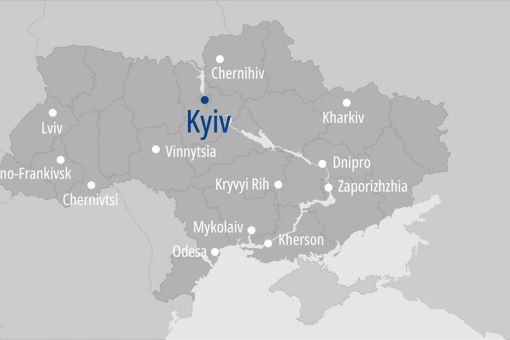
Kyiv is regarded as an undisputed economic and commercial centre and an important location for industry, science, education and culture. Due to its central role, the city has been particularly targeted in the Russian war of aggression. Nevertheless, Kyiv also offers opportunities for future economic development.
The manufacturer Knauf, for example, is already expanding its capacities and building a second plant in the western part of the country. It will complement the existing plant in Kyiv, which produces around 25 million square metres of plasterboard and 200,000 tonnes of drywall mixes every year. Experts assume that demand will increase significantly after the war, while total Ukrainian production is only expected to cover around 90 per cent of the required volume. This opens up opportunities for investors to enable the reconstruction of the country - not only in Kyiv, but throughout the country.
However, Kyiv is not only dependent on individual sectors. Education and the cultural scene also play a central role for the city. After the war, a considerable need for investment is expected here, which could provide further economic impetus.
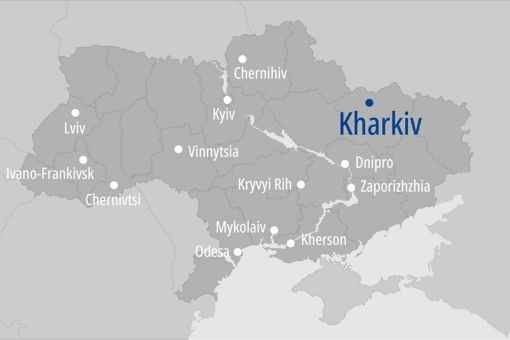
Kharkiv is one of the most important industrial and educational centers in Ukraine and is located on central transport axes with good connections to national and international rail and road links. The city has a broad industrial base in mechanical engineering, vehicle construction, metal processing, electrical and chemical industries. At the same time, Kharkiv is an important IT location with over 25,000 specialists and a strong higher education landscape with 38 universities and around 300,000 students.
Due to the severe destruction caused by the war, there is a considerable need for reconstruction in terms of transport infrastructure, energy facilities, educational institutions and commercial space. This will create a wide range of investment opportunities in the construction industry, logistics, energy, healthcare and education. In addition, a planned underground industrial park will strengthen the region's industrial resilience.
There is particular potential in IT and technology solutions, industrial modernization, reconstruction projects and the development of new supply systems and urban infrastructure.
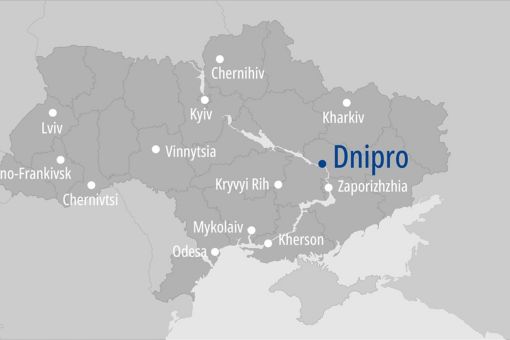
The city of Dnipro is part of the Dnepr economic region and is heavily industrialised. Mechanical engineering, metallurgy and high technology in particular play a key economic role. The space and rocket industries as well as the financial sector are also important industries.
Defence production is a key industry in Dnipro. The well-known defence company Piwdenmash is a leading manufacturer of missiles, but also produces trams, agricultural machinery and satellite technology. The company employs over 13,000 people. The city is also characterised by a diverse industrial landscape - from metal construction companies and tyre manufacturers to producers of wind turbines. Renewable energies in particular could be one of the most attractive areas for investment after the war, as Ukraine is actively promoting the expansion of sustainable energy sources.
In addition to industry, Dnipro is also an important service and financial centre. Numerous banks and insurance companies are based here. These sectors can play a key role in reconstruction. The property and construction sectors in particular offer potential. Participation in the revitalisation of the metallurgy sector is also being sought.
Zaporizhzhia is one of the central industrial and energy locations in Ukraine. Its location on the Dnipro and on important east-west transportation axes ensures that heavy industry, energy production and logistics are directly interlinked. The region has a strong metal and mechanical engineering industry, which also includes large companies such as Zaporizhstal and the Metinvest Group. Another advantage of the location is its proximity to large energy plants, including hydroelectric power plants and the nuclear power plant located in the oblast, which provides structural support for energy-intensive industries.
Technical universities and engineering faculties in the city ensure a continuous pool of skilled workers for the metallurgy, energy systems and mechanical engineering sectors. Despite the effects of the war, the industrial base has a largely stable core structure. Following the restoration of damaged facilities, Zaporizhzhia is considered a location with considerable opportunities for the green energy, modern metallurgy, manufacturing, logistics and construction sectors.
Kryvyi Rih is located in the center of the largest contiguous iron ore basin in Europe and has an economy that is completely geared towards this geological feature. The city combines mining, ore processing, steel production and logistics within short distances, making the region one of the most efficient metallurgical locations in the country. Large corporations operate highly specialized production facilities here; at the same time, there are strong supplier networks in mechanical engineering, metal processing and the construction materials industry.
The infrastructure around Kryvyi Rih - railroad lines, highways, storage centers and an airport - is clearly geared towards industrial supply chains. Technical educational institutions cover specialist areas such as mining technology, metallurgy and production automation. For investors, the reconstruction opens up broad scope: modernization of industrial facilities, digital transformation of manufacturing, expansion of logistics, IT, construction and resource-efficient energy infrastructure.
Mykolaiv is a key location for the maritime economy in Ukraine. Thanks to its location on the Southern Bug - a tributary of the Black Sea - and its proximity to the coast, the region has three seaports, a river port and direct waterways to the sea. This enables the efficient export of industrial goods and agricultural products. Mykolaiv is traditionally a center of shipbuilding, supported by specialized engineering colleges and shipyard capacities focused on large ships and maritime components.
In addition to the maritime industry, the economic area is also characterized by mechanical engineering, food processing, energy infrastructure and agriculture. The region has logistical hubs, production facilities for industrial inputs and a diverse range of skilled workers. There is future potential in areas such as port modernization, construction, the food industry, water management, renewable energy, logistics centers and the "blue economy", which focuses on maritime resources.
Vinnytsia is considered one of the most stable and economically dynamic locations in Ukraine. The city is located on central transport axes between western and central Ukraine and is well connected to international markets. A modern industrial park, a technology park, logistics areas and advanced smart city and digitalization initiatives create a business-friendly environment. Vinnytsia is characterized by an efficient administration and has earned a reputation within Ukraine as a particularly investor-friendly location.
The educational landscape is wide-ranging, with a strong focus on IT, mechanical engineering, food technology and healthcare. The local economy is based on food production, mechanical engineering, creative industries, IT and pharmaceuticals. Investment opportunities exist in industrial development, technology, energy efficiency, logistics, food and beverage production, construction and renewable energy.
Chernihiv is conveniently located in the north of Ukraine, close to the main connections to Kyiv, the Baltic region and EU-oriented supply chains. The city has a river port on the Desna and direct road and rail connections. This allows companies to efficiently transport both agricultural products and industrial goods. Chernihiv has a stable base of small and medium-sized enterprises, complemented by growing activities in IT and manufacturing industries.
The authorities work with simplified approval procedures and quick connection options for new companies, which makes the location particularly attractive for regional investments. The region also benefits from an export-oriented agricultural sector, particularly in grain, food and wood products. There is potential in agriculture, food processing, the timber industry, logistics, tourism, the construction industry and the development of new production capacities.
Kherson is located at the mouth of the Dnipro River and has direct access to the Black Sea. This location has always made the region an important location for agriculture and logistics. The fertile soils, the well-developed irrigation system and the many years of experience in fruit, vegetable and rice cultivation form a strong agricultural base. At the same time, there is access to port infrastructure, railroad lines and central road connections.
Before the war, Kherson was an industrial and agricultural center with mechanical engineering, food production and port logistics. Educational institutions such as universities and agricultural faculties provide qualified specialists. There is also investment potential for the future in agriculture, renewable energies, food processing, port and logistics infrastructure, construction and modern industry.
Chernivtsi is located in the west of Ukraine in close proximity to Romania and Moldova, which gives the city access to EU-oriented trade routes. The regional economy is diversified, with a focus on light industry, wood processing, food production and services. Chernivtsi University provides a well-trained workforce in administration, IT, education and business.
The city administration actively promotes new industrial and commercial areas, which facilitates site development. Due to its geographical location, Chernivtsi is particularly suitable for companies that deliver to the EU or want to benefit from Europe-oriented supply chains. Investment opportunities exist above all in agricultural processing, textile and furniture production, logistics, tourism and the use of new business parks.
Ivano-Frankivsk is an increasingly important economic hub in western Ukraine and connects the Carpathian region directly with EU markets via road and rail links. The city has energy infrastructure including regional gas production and industrial energy facilities. The economic profile includes industrial production, food industry, creative industries and services.
The city's universities are focused on engineering, IT and business and provide a skilled workforce. The region shows dynamic developments in the construction and energy sectors, in the food industry and in tourism, especially in the Carpathian regions. There is potential in energy production, construction, agricultural and food processing, creative industries, industrial production and sustainable tourism.
Your contact person
Stay up to date with what matters to you
Gain access to personalized content based on your interests by signing up today
Nicolai Kiskalt
Partner
KPMG AG Wirtschaftsprüfungsgesellschaft
Connect with us
- Find office locations kpmg.findOfficeLocations
- kpmg.emailUs
- Social media @ KPMG kpmg.socialMedia


